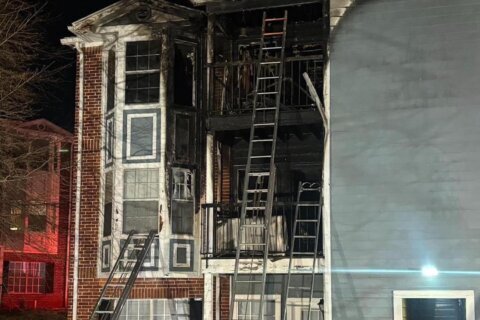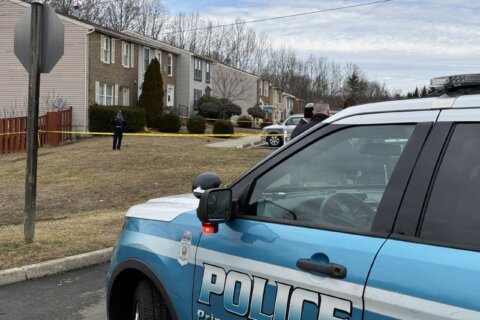This article was republished with permission from WTOP’s news partner InsideNoVa.com. Sign up for InsideNoVa.com’s free email subscription today.

This article was written by WTOP’s news partner InsideNoVa.com and republished with permission. Sign up for InsideNoVa.com’s free email subscription today.
Members of Prince William County’s Racial and Social Justice Commission believe they’re getting work done in committee meetings, but tensions are simmering in gatherings of the full panel.
While the commission was able to have some substantive discussion with community leaders, a large portion of its May 20 meeting was spent in arguments over procedure, policy and decorum.
In stark contrast, the May 24 meeting of the policing subcommittee ran smoothly and concisely with discussion of various topics — a difference noted by commissioners.
The panel, approved by the Board of Supervisors in October, is tasked with delivering a report that examines “the state of racial and social justice for people of color” in the county and making recommendations to the county government. Its initial focus is on policing, the provision of government services and public education.
The commission’s full meetings have been marked with objections on numerous procedural matters by Coles Commissioner Charles Haddow. May 20 was no different.
The agenda included speakers from different religious sectors of the community. However, the panel spent its first 30 minutes in heated discussion as Haddow objected to the approval of minutes from the April 15 meeting.
Haddow wanted the minutes to reflect that he had objected to a motion at the April 15 meeting that Potomac Commissioner Oliver Allen, the panel’s parliamentarian, had ruled was out of order. The parliamentarian serves to advise the chair on procedural matters.
After about 30 minutes of back-and-forth, Haddow made a motion to have his objection from the previous meeting included in the minutes. It passed 9-3 with Chair Shantell Rock, At-Large Commissioner Jahanzeb Akbar and School Board member Loree Williams voting against it.
Frustrations were clear in the voices and faces of some commissioners, who have been dissatisfied with the length of full commission meetings.
“I feel like you came into this looking for justification or a fight and we came here to get down to the business that we came here to do,” Rock said to Haddow. “It seems like, in my personal opinion, an ego thing.”
Afterward, Rock tried to move into public comment, but Haddow asked Allen to further explain his ruling that the motion had been out of order at the last meeting. Rock continued to push forward, but Haddow kept speaking over her and would not allow the meeting to move forward.
Allen eventually weighed in to say he had no further comment on his ruling, and the meeting continued.
Before public comment, however, the commission added two agenda items. Commissioners then traded barbs about adding items at the last minute, with Akbar saying discussion points should be brought up earlier and Haddow saying Akbar is late providing agendas to the committee meetings he leads.
The speakers at the May 20 meeting discussed several of the same topics. They raised concerns about achievement gaps for students of color who might not have reliable access to the internet for virtual learning during the pandemic. They advocated for more affordable housing, funding for mental health services and changes to the school resource officer program.
“Part of the problem is we get comfortable with what is and we don’t feel it’s necessary to change it,” said the Rev. Keith Savage of First Baptist Church in Manassas. “It’s about making sure that we help the county … see their blind spots.”
Following the speakers, the commission discussed the role of the School Board in its work. The topic again devolved into heated disagreements among Haddow and other commissioners and Raul Torres, executive director of the county’s Human Rights Commission.
After nearly 30 minutes of discussion, the commission agreed that its final report would be sent to the Board of County Supervisors, which has final say over where it is disseminated. Even if supervisors don’t choose to formally send it to the School Board, the report will still be publicly available and accessible to the schools.
Gainesville Commissioner Erica Tredinnick then brought forward concerns that the full commission was not discussing all the information shared in committee meetings. She said the panel’s mission is being carried out in its committee meetings better than in full commission gatherings.
“We don’t have arguments, we have good conversations and discuss things and come up with action items,” she said. “There’s positive things that are coming out of those conversations about Prince William County.”
Tredinnick said she’s interested in the topics discussed in other committees, but is unable to attend and is “feeling robbed.” She said full commission meetings are lasting several hours and frequently touching on national or state issues rather than local topics.
Rock said the meetings wouldn’t take so long without arguments over procedural matters. The commission then spent another 30 minutes going back-and-forth over the causes of the meetings running long.
Treddinick said her concern could have been quickly addressed and should not have turned into bickering.
“It should not take this long,” she added. “It’s ridiculous.”
Haddow acknowledged that “part of this is my insistence that we follow these procedures,” but that it’s important to follow rules in conducting public business. He implored the board to set aside “personal animus.”
In contrast, the policing committee’s May 24 meeting didn’t devolve into arguments or disagreements. The committee heard from the Rev. Cozy Bailey of the county NAACP and Heather Baxter, a licensed professional counselor with the county’s co-responder unit.
Most of the committee’s work focused on the co-responder program, which pairs emergency services clinicians with police officers certified in crisis intervention to respond to calls throughout the county.
The only moment when the committee wasn’t on the same page came at the very end of the meeting when Brentsville Commissioner London Steverson delivered remarks on policing, saying the committee should instead be examining the whole criminal justice system, including judges and prosecutors.
“If we continue to focus on the street cops, we will never find [systemic racism]. It’s not there,” he said. “The police are a small part of the system. It’s systemic. It’s institutional. It’s not just the police. … Police are just footmen at the bottom of the totem pole.”
Curtis Porter, chair of the Human Rights Commission, pointed out that while Steverson’s concerns were valid, they fall outside the committee’s purview.
At the end of the May 20 meeting, Rock, the chair, was despondent and said the constant bickering has been disillusioning.
“It’s such a shame if we can’t come as decent people without people thinking they have their own agenda,” she said. “It just makes me so ashamed because I don’t understand it. I don’t get it. I hate politics. And I feel like that’s what this commission has become. … I came on this commission as a naive citizen just wanting to help the residents. … The experience I’ve been experiencing so far has not been great. And I’m not happy about it at all.”








